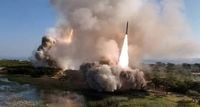North Korea has once again thrust itself into the international spotlight, conducting tests of two new air defense missiles under the watchful eye of leader Kim Jong Un. The tests, reported by the Korean Central News Agency (KCNA) on August 23, 2025, showcased what Pyongyang described as "superior combat capability" and a "fast response" to aerial threats such as attack drones and cruise missiles. The announcement, notably timed just before a high-profile meeting between U.S. President Donald Trump and South Korea’s President Lee Jae-myung in Washington, DC, has only heightened regional anxieties.
According to KCNA, the operation and reaction mode of these new missiles is "based on unique and special technology." While the North Korean state media stopped short of revealing technical details or even the location of the tests, officials emphasized that the upgraded systems are designed to destroy a variety of airborne targets. Kim Jong Un reportedly tasked the country's defense science sector with an "important mission" to be completed ahead of an upcoming major party meeting, adding a sense of urgency and strategic calculation to the missile launches.
The missile tests come against a backdrop of escalating tensions on the Korean Peninsula. Just days prior, on August 19, approximately 30 North Korean soldiers briefly crossed the heavily fortified border into South Korea. The United Nations Command, corroborated by the Yonhap news agency, confirmed the incursion. South Korean troops quickly responded by firing warning shots, a move that underscored the hair-trigger alertness along the Demilitarized Zone (DMZ).
North Korean Army Lieutenant General Ko Jong Chol wasted no time in characterizing the border incident as a serious provocation. In statements carried by North Korean media, Ko called the crossing a "premeditated and deliberate provocation," warning, "This is a very serious prelude that would inevitably drive the situation in the southern border area, where a huge number of forces are stationing in confrontation with each other, to the uncontrollable phase." His words painted a picture of a region teetering on the edge, where even brief missteps could escalate into full-blown crisis.
Pyongyang’s strong language was matched by its actions. The missile launches coincided with large-scale joint military exercises between the United States and South Korea. North Korea has long condemned these drills, characterizing them as invasion rehearsals and clear evidence of what it sees as hostile intent. Earlier this month, Kim Jong Un himself denounced the joint exercises, pledging to speed up his country’s nuclear build-up in response. He accused the U.S. and South Korea of maintaining the "most hostile and confrontational" stance toward the North, according to KCNA reports.
For South Korea, the situation is particularly delicate. President Lee Jae-myung, who only recently took office, has made overtures toward his northern neighbor, promising to build "military trust" and improve bilateral ties. Lee’s administration has articulated a vision of warmer relations and reduced military tensions, a sharp contrast to the chill that has characterized inter-Korean relations in recent years. Yet, despite these gestures, Pyongyang has shown little interest in dialogue. North Korean officials have openly dismissed Seoul’s initiatives, signaling a hardline stance and an unwillingness to engage in talks—at least for now.
According to reporting from Khaama Press, North Korea’s missile launches were not merely technical demonstrations but also political statements. The tests were conducted under Kim Jong Un’s direct supervision, a detail that underscores their importance in Pyongyang’s broader strategic playbook. The KCNA report noted that Kim had assigned the defense science sector a mission of "particular significance" to be completed ahead of an upcoming major party meeting, fueling speculation about further weapons development or military posturing in the near future.
Meanwhile, the border remains a flashpoint. The brief incursion by North Korean troops—thirty soldiers, by most accounts—was met with a swift response from the South. Warning shots were fired, and the incident quickly drew international attention. The United Nations Command’s confirmation of the border crossing lent further gravity to the episode, highlighting the persistent risks of miscalculation and escalation in one of the world’s most heavily militarized zones.
North Korea’s rhetoric in the aftermath was uncompromising. Lieutenant General Ko Jong Chol’s remarks, as reported by state media, left little doubt about Pyongyang’s perspective: the border incident was not an accident but a deliberate provocation by the South. "This is a very serious prelude that would inevitably drive the situation in the southern border area… to the uncontrollable phase," Ko declared. Such statements serve as both warning and justification for North Korea’s subsequent military actions, including the missile tests.
For its part, South Korea has reiterated its commitment to de-escalation and dialogue. President Lee’s promises to build military trust have been met with skepticism in Pyongyang, but Seoul continues to advocate for a reduction in tensions. The challenge, however, remains formidable. North Korea’s repeated dismissal of dialogue initiatives and its continued weapons development make progress elusive.
The timing of these developments is also significant. The missile tests and border incidents unfolded just as U.S. President Donald Trump was preparing to meet President Lee Jae-myung in Washington. The summit, already expected to focus on security and alliance issues, now takes on added urgency. North Korea’s actions serve as a stark reminder of the persistent volatility on the peninsula and the complex interplay of military, political, and diplomatic factors at work.
International observers are watching closely. The joint U.S.-South Korea military exercises, which North Korea decries as invasion rehearsals, are a perennial source of friction. Pyongyang’s pattern of responding to these drills with weapons tests is well established, but the introduction of new missile technology adds a fresh layer of concern. The North’s claim that its new systems are based on "unique and specialized technology" suggests ongoing advances in its military capabilities, though independent verification remains elusive.
As the region braces for the next moves—whether further weapons tests, diplomatic overtures, or renewed provocations—the stakes could hardly be higher. The Korean Peninsula remains a place where history, ideology, and military might intersect, often with little warning. For now, both sides are signaling resolve, and the world is left to hope that cooler heads will prevail before tensions spiral out of control.
The latest missile tests and border skirmishes serve as a sobering reminder: peace on the peninsula remains fragile, and the path forward is anything but certain.




